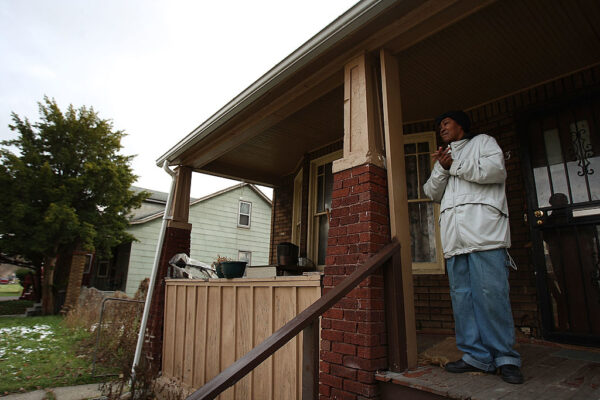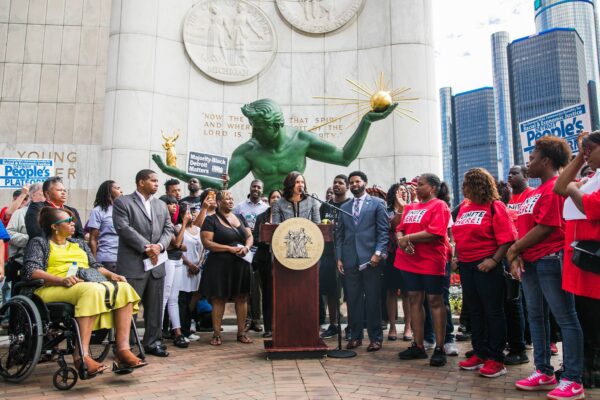About 100,000 Detroit’s residents lost their homes to foreclosures because the city overcharged them for property taxes. The city owned up to the mistake, but the residents are still waiting to be reimbursed five years later.
Detroit owes the mostly Black residents $600 million, according to reports. Between 2010 and 2016, the city assesses properties at 85 percent of their market value, going against state law. The Michigan Constitution prohibits property from being assessed at more than 50 percent of its market value.

Grassroots organization, the Coalition For Property Tax Justice, has been advocating for Detroit to repay the residents since 2017. They have even helped the city by drafting proposals, but some city leaders have rejected their plans leaving the hundreds of thousands of residents who lost their homes in limbo.
Many Americans work to accomplish the goal of homeownership. However, for Black Americans, the dream of the white picket fence could be harder to achieve, data shows. Advocates said the over-taxation of the Detroit residents is racial injustice issue that blocks inter-generational wealth.
Detroit resident Sonja Bonnett said losing her home to foreclosure created a whirlwind in her life.
“When I lost my home, I didn’t just lose a structure: I lost my health; I lost my footing; I lost confidence in myself,” Bonnett said. “I think that the city really needs to know that when you put the community in these positions, you’re not just taking a building from us. You’re taking the American Dream from us. You’re taking what some of us are so proud to gain in the first place, which is a family home. And when it happened to me, it almost destroyed me. It almost destroyed my family.”
The disparity between white and Black homeownership is the key driver of the racial wealth gap in the nation, research shows. U.S. Census data shows about 75 percent of white Americans owned homes, while the rate among Black Americans is 44 percent. Wayne County’s majority-Black municipalities — Detroit, Highland Park and Inkster — have a higher foreclosure rate than mostly-white localities, according to reports.
Looking to get “swift and meaningful compensation” for residents, the Coalition For Property Tax Justice surveyed those impacted and asked them how they would like to be repaid. City leaders have tentatively agreed to spend just 1 percent or $6 million on resources for over-billed residents. The organization released the survey report on April 14, hoping to get a plan rolling, but it may remain stalled.
Most of the residents surveyed want cash payments, but the mayor’s office contends that Michigan law bars the city from providing cash payments or tax credits. Advocates disagree and call on the state attorney general to review the law.
Detroit Councilmember Mary Sheffield, who has also advocated for the residents to be repaid, said the council is working with the state Legislature to review laws that would block them from being reimbursed.

“We are working diligently and very hard to find solutions,” Sheffield said. “We don’t just want to put a Band-Aid on it and not get to the core of what happened.”
Advocates say the city could compensate the homeowners in other ways, such as home repair grants, houses, or side lots from the Detroit Land Bank and Section 8 vouchers. They also proposed giving the overbilled residents small business assistance and employment opportunities.
Detroit Mayor Mike Duggan proposed a plan in 2020 that offered the homeowners a 50 percent discount on city-controlled vacant properties and would have fast-tracked them to the top of the list for affordable housing and city jobs.
However, it was limited to those who owned a home in the city and lived in it as a primary residence between 2010 and 2013, which reportedly amounts to about 130,000 residents. It would have cost the city the same $6 million. The city council struck down the plan. Sheffield said it was “inadequate” and would only compensate a fraction of the over-assessed homeowners.
Bernadette Atuahene, a professor at Chicago-Kent College of Law and member of the Coalition For Property Tax Justice, said the city took more than the residents’ homes. She said they also stripped them of their dignity.
“There are other instances where they take something from you as part of a larger strategy of dehumanization, or infantilization, or a larger process of structural racism,” Atuahene said.
“The idea is to say when this larger harm called the dignity-taking has occurred, mere reparations are not enough. Just giving you compensation for the thing taken is not enough,” she said.
“What’s required is a more robust remedy that I call dignity restoration, and that’s the process of giving you compensation for things taken, but through a process that affirms your humanity and restores your agency.”


